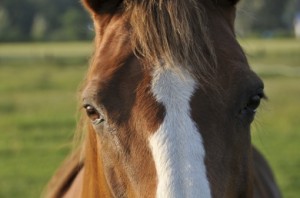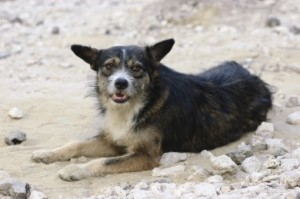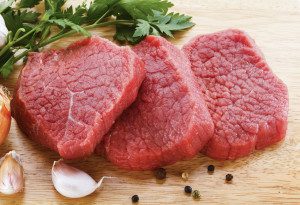Worldlog Settimana 14 – 2014
La scorsa settimana è arrivata la notizia che Eyes on Animals (organizzazione di controllo per gli animali da allevamento) ha studiato l’origine della carne di cavallo venduto nei supermercati olandesi. I risultati di questa ricerca sono scioccanti. Essa mostra che tanta carne di cavallo nei negozi olandesi proviene da cavalli macellati in Nord e Sud America, e che lì sono stati gravemente maltrattati. Quindi noi abbiamo chiesto un dibattito e una maggioranza è favorevole a tale richiesta.
Per due anni, varie aste di cavalli, macelli e trasporti di cavalli negli Stati Uniti, Messico, Canada e Argentina sono stati controllati da Eyes on Animals. Carni di questi cavalli, è esportato in Olanda su larga scala. Durante il trasporto, che a volte durano 36 ore, i cavalli ricevono poco o nessun’acqua, il cibo e riposo… Vagoni affollati con cavalli esausti, feriti ed emaciati non sono casi eccezionali.
Gli ispettori hanno visto autisti colpire dei cavalli caduti con spranghe di ferro o pungoli elettrici per farli rialzarsi in piedi. Puledri sono stati calpestati dai cavalli adulti sono stati gravemente feriti o morivano lentamente. Gli animali sono stati trasportati in condizioni climatiche estreme. Cavalli sono per esempio stati trasportati con caldo desertico in carri bestiame senza tetto. Noi vogliamo un divieto d’importazione di carne di cavallo proveniente da Stati Uniti, Messico, Canada e Argentina!
La settimana scorsa ho fatto interrogazioni parlamentari sulla caccia premio ai cani randagi in Romania. Una clinica veterinaria di cani in Romania è stata derubata Venerdì, da cacciatori di taglie, perché le autorità rumene danno i soldi per ogni cane catturato. Noi Vogliamo che il governo olandese sollecita le autorità rumene per fermare il sistema in cui è premiata la cattura e l’uccisione dei cani randagi.
Le autorità romene continuano a incoraggiare l’uccisione dei cani randagi con un sistema di ricompensi di 50 euro per ogni cane ucciso. E inaccettabile che il governo rumeno incoraggia i suoi cittadini con un incentivo perverso a premio alla cattura e l’uccisione di cani. Un tale atteggiamento crudele verso gli animali randagi è insostenibile in uno Stato membro dell’Unione europea. Voglio che il governo olandese solleciti il governo rumeno a fermare la politica feroce dei cani randagi e il sistema di remunerazione a premio e di passare alla cattura, la sterilizzazione e il riposzionemanto.
A fine settembre la Corte Costituzionale rumena ha approvato una legge che ora porterà a un massacro di tre milioni di cani randagi che vivono in Romania. La nuova legge permette l’uccisione dei randagi dopo aver trascorso due settimane in un canile se non c’è abbastanza spazio nei canali per mantenere i cani, o quando le risorse per il cibo adeguato o cure mediche sono carenti. In questo momento, cani sono uccisi in massa. Questa cosa deve fermarsi!
Ho fatto anche interrogazioni parlamentari sul servire di carne proveniente di animali di macellazione rituale durante il vertice nucleare della scorsa settimana a L’Aia. Carne halal dovrebbe essere parte del pranzo che ai leader di governo è offerta, secondo il capo ristoratore durante un’intervista su Radio1.
Voglio sapere dal governo e se la carne era da animali macellati senza l’uso di anestetici. Nessuno dovrebbe ricevere servito della carne, senza averne dato il consenso, proveniente da animali macellati senza l’uso di anestetici. Si deve porre fina al più presto alla macellazione rituale senza uso di anestetici e finché ciò non è vietato, i consumatori – in questo caso i partecipanti al summit – devono essere informati dal fatto che è offerto della carne da macellazione rituale senza uso di anestetici.
Questo è un filmato da non perdere per iniziare la settimana:
752 Rescued Hens Feel Sunshine for the First Time
Un consiglio per chi pensa che economia è più importante che ecologia.
A presto!
Last week, it was in the news that Eyes on Animals (Inspection Organisation for Farm Animals) conducted an investigation into the origin of horse meat sold in Dutch supermarkets. The results of this investigation are shocking. Much of the horse meat sold in Dutch shops is from horses that are slaughtered in North and South America, and which are seriously mistreated. We asked for a debate on this subject and a majority has supported our request.
For two years, Eyes on Animals inspected various horse auctions, slaughterhouses and horse transportations in the United States, Mexico, Canada and Argentina. The meat of those horses is exported to the Netherlands on a large scale. During these transports, which sometimes take up to 36 hours, the horses get no or hardly any water, food or rest. Overcrowded cattle trucks with exhausted, injured and starved horses are no exception.
Inspectors could see how the drivers hit horses, which had fallen, with iron bars and electric sticks to get them up again. Foals were trampled by adult horses and were severely injured or died slowly. The animals were transported under extreme weather conditions. For example, horses were transported during severe desert heat in cattle trucks with no roofs. We want to ban the import of horse meat from the United States, Mexico, Canada and Argentina!
I asked Parliamentary questions last week about the premium hunting for stray dogs in Romania. Last Friday, premium hunters stole all the dogs from a dog clinic in Romania because the Romanian authorities pay money for each dog that is caught. We want the Dutch government to urge the Romanian authorities to stop the system where people are rewarded for catching and killing stray dogs.
The Romanian authorities keep encouraging the killing of stray dogs with a remuneration system where they reward an amount of 50 euros for each dog killed. It is unacceptable that the Romanian Government encourages its civilians with a perverse remuneration incentive to catch and kill dogs. Such a cruel attitude towards stray animals is unacceptable in a Member State of the European Union. I want the Dutch government to urge the Romanian government to stop its cruel stray dog policy using a remuneration system and to change their policy into one of providing shelter, neutering and returning them.
Late September last year, the Romanian Constitutional Court approved an act that now leads to a mass slaughter among three million stray dogs living in Romania. The new Act allows the killing of stray dogs after they have been in a shelter for fourteen days, or if there is not enough room to keep them in the shelters, or if there are no means for sufficient food or medical care. Dogs are killed en masse. This has to stop!
I have also asked Parliamentary questions about the meat that was served during the Nuclear Security Summit in The Hague last week, which was apparently from ritually slaughtered animals. According to the main caterer in an interview on Radio1, halal meat was part of the lunch served to the government leaders.
I want to hear from the parliament if this meat was from animals that were slaughtered without sedation. Nobody should be served meat from ritual slaughter without particularly asking for it. Ritual unsedated slaughtering should be put to an end as soon as possible and for as long as it is not banned, consumers – in this case the participants to the Summit – should be informed of the fact that they are served meat from unsedated ritual slaughter.
You should start your week with this small film:
752 Rescued Hens Feel Sunshine for the First Time
Tip for anyone who thinks that economy is more important than ecology.
Until soon!


